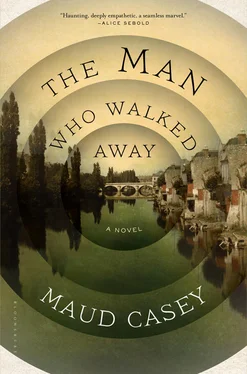“Will you take my arm?” Marian asks, straightening her veil. She misses him when he is not at her side pestering her.
“Of course, my dear,” he says, and they follow the Director, who walks ahead of Henri and Samuel, safe again inside his giant coat.
“Sammy’s fine,” Henri says, fixing Samuel’s coat more securely around his shoulders. “You’re tired is all. We’re all tired.”
Through the woods they go and back up the slope. Back along the birch-lined path, and then they are trooping into the common room in their wet and muddied clothes, clumps of creek clay on their shoes. “I see you’ve brought nature back with you,” says Nurse Anne. “I suppose it might get lonely out there on its own.” She eyes Samuel trembling in his coat and Rachel’s freshly tear-streaked face.
“Wait,” and she wipes the mud off Rachel’s skirt before Rachel sits down at the piano.
These trips always end this way, in tears or something like tears, even when there is a curious fox or the beautiful wing of a bird. But for that fleeting moment of quiet contemplation, the Director will return to the creek again and again and again. He salutes Nurse Anne with his trowel; despite her scowl, he knows she believes it is worth it too.
“Who knew there was so much mud in the world?” she says. But she does trust him, this man who treats patients as children rather than animals, who prefers walks in nature to bloodletting, chains, and manacles, who has faith that patients may be restored through self-discipline in a place that is more a household than an institution, who knows he does not have all of the answers but believes he is doing his best. Rachel begins to play a Beethoven sonata; its bright key of E major suggests a desire to return to serenity, but first it wanders through improvisational wilderness. Marian curls into the armchair by the fire and Walter settles by her feet to continue talking about the voluptuousness he feels in the midst of nature. “Yes, yes,” Marian says. “A furry, furry rabbit.” Elizabeth has returned to the puzzle she undid this morning in order to start over again, and Samuel hovers in a corner whispering to Henri. Nurse Anne truly believes the Director is doing his best. It is why she is here. It is why she stays.
“You look very well,” she says to Marian. “You too,” she says to Walter. On her way past, Nurse Anne touches Samuel’s shoulder, hidden somewhere in that giant coat. Order, the comfort of structure — this is what she has to offer. It’s what keeps her own occasional desire to flee these people from creeping into her voice. She calms herself by thinking of that time on her way to and from the asylum, not there yet, not yet home, the time she has to herself when she thinks only of her body moving through the cool spring air— this, this, this . “Tomorrow will bring a new day,” she says when Elizabeth, distressed over a missing puzzle piece, the piece that’s always been missing, begins to twitch. Nurse Anne imagines tomorrow as a shadowy figure delivering a tiny wrapped gift and she almost laughs at the idea of unwrapping the new day: Fresh terror! But she doesn’t laugh. She bends down, knees cracking, and tries to catch Elizabeth’s shifting eye, which hovers around the blank space where the puzzle piece should go. “Tomorrow will bring a new day,” Nurse Anne says again in her gentle, persuasive tone, and who could argue with that?
What was the question?
The only problem with oblivion is it doesn’t last. Over and over, Albert has woken not knowing where he is — here, then there — not knowing how he got there. The sky filling with those charcoal clouds darkening the whole world and him too, and then he’s fading again with that terrible thirst, sweating and trembling, his body ringing with the ache of it until finally the ringing becomes a song. Oh, Albert. He is beautiful in the song, walking, astonished, but the song keeps ending and the sky keeps filling with those charcoal clouds and he is so tired.
He walks through time as if it were as transparent as the bright spring air. But it is not. Tomorrow he will appear in the courtyard of the asylum across from the small stone church, but first there is Albert walking through time as if it had nothing to do with him.
Fascinating? Magnificent? Yet another escapade?
He discovers himself lying naked in the dark, not knowing where he is, not knowing how he got there. A fleeting illumination along the pitch-dark trail of his mind: there had been a shimmer on the verge of taking shape, and something unfolded deep inside of him, a pocket of space that opened and opened and opened until it was a hole through which he was falling. He fell through himself, and now he is here. “But you told me to wake you. Last night you told me,” a woman is saying, her heart-shaped face losing its heart in her anger. “You said wake me. You said I need to get the train in the direction of Lectoure. It is not my fault you are angry.” She slams the door behind her, and Albert lights the gas lamp to study the situation, first throwing back the covers to see what is left of him. All of it; it’s all there. He touches his velvety cock, rising to meet his hand, ready for a crescendo that will lift him out of himself, save him from this terror of not knowing, of never knowing. The woman with the heart-shaped face was pretty even as her face lost its heart. A fleeting illumination: a woman lay down beside him once in a field where he slept, sent over by people standing around a fire. “They’ll pay me if they can watch,” the woman said, putting her hand on his beautiful instrument, but she wanted money, and besides, it is safer and easier for him to take care of his own pleasure, which he does while thinking of that woman and her quick hand, its smoky smell, and the swing of her large hips, her supple ass as she walked back to join the fire people. When he is done, when he is not fortunate enough to be lifted into the oblivion that obliterates the problem of now, what can he do but wash and dress in this hotel room he doesn’t remember checking himself into? Reaching into his jacket pocket, he discovers a train ticket he doesn’t remember purchasing. He wishes he could leave himself behind in the tangled sheets he doesn’t remember sleeping in. Stay here. Don’t follow me. But there he is, still himself, insisting.
“Do you know when is the train in the direction of Arcachon?” a man in the lobby asks the clerk. Hearing the word, Albert is suddenly very thirsty. Arcachon Arcachon Arcachon. The tremor moves through his toes into the arch of his right foot and when he tries to jiggle it loose, the urge leaps into the other foot. Arcachon Arcachon Arcachon . The ringing in his ears has become a song and off he goes until he is falling through the pocket of space that opens without warning inside of him into another unfamiliar place.
There are moments when he thinks he might be dreaming, that it has all been a dream from which he might awake. This is what he wishes when he discovers himself behind the horse and its rider on a muddy road with a rut six feet deep. Without warning they begin to sink. Albert’s heart lifts at first. Surely this must be a dream. The rider kicks the horse, beats it with a stick, but the mud holds the horse fast, sucking it down. Kicking and beating are of no use and the rider is forced to leap off, to watch helplessly as the horse sinks up to its chest, its neck thrashing. Albert watches with the rider, who weeps as the horse thrashes and squeals until mud fills its nostrils and its mouth, until it is too tired to squeal. The horse’s eyes stop rolling back in its head; they go still with hopelessness. It is better not to thrash , the eyes say.
Several men happen by in a carriage; with a rope they help the weeping rider drag the enormous body of the horse out of the sucking mud. After everyone has gone, Albert watches the still surface as though something might rise up out of it. It is better not to thrash. He is thick and deaf with sludge. He doesn’t care anymore if the urge to walk comes or not. He is a shrouded version of a man who will leave behind only his simple, heavy body to be carried away. If he doesn’t thrash, will someone carry him away, out of this life?
Читать дальше












